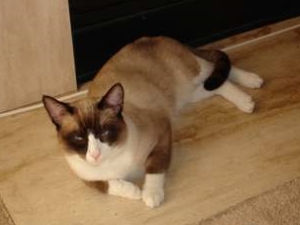Cat Vomiting. Why Is Your Cat Throwing Up?
Vomiting in cats – what causes it, what can you do, and how serious is it if your cat is vomiting blood?
Find out just why your kitty is throwing up, and how to care for it when it does. The first thing to do is to discover why your cat is vomiting.
Cat Vomiting Causes
The sight of cats throwing up isn't pleasant, and it can be extremely worrying. But there are many reasons for vomiting in cats, from minor digestive upsets and hairballs to much more serious problems.
The chances are that if the vomiting isn't happening very often, the reason is likely to be one of the minor ones. But if cats keep on vomiting, the problem may be a little more serious.
Causes of cat vomiting may include:
- Hairballs
- Digestive upsets
- Overfeeding
- Worms
- Viral or bacterial infections
- Digestive diseases
- Heat exhaustion
- Poisoning
- Stomach ulcers
- Cancer
What’s in the Vomit?
Take a good look at your cat's vomit.
Yes, I'm sorry, and I
know you'd rather not, but you do want to find out why your kitty is
sick, don't you? It helps if you pretend you're a CSI ...
You can tell a lot from a cat's vomit, and if you need advice from a vet, the more you can tell them, the better. So what can you see? Is the vomit clear? Or is it frothy, yellow or green?
Does the Vomit Contain ...
Grass?
Outdoor cats (and cats with indoor 'grass gardens') sometimes eat grass if they're feeling a little unwell, to make themselves throw up. If the vomit is clear with grass in it, and your pet seems otherwise well, there's probably no reason to worry.
Fur?
If you have a long haired cat who's thrown up what looks like a mass of fur, it's probably a hairball.
The occasional hairball is OK (see prevention, below) but cats vomiting hairballs repeatedly may be a problem, as this can lead to hair moving further down the digestive tract where it can cause a blockage.
A veterinarian will be able to advise you on the best course of action for hairballs.
Undigested food?
Cats vomiting food may just indicate overfeeding. Again, once is probably nothing to worry about, but if this happens repeatedly, get your cat checked out by a vet in case there's a more serious underlying reason.
A mass of spaghetti-like worms?
These are worms. Don't attempt to treat them yourself. Contact your veterinarian for the best course of action.
If you can bear it, scoop the worms into a container and take them with you to the vet's so that they can be identified.
Blood?
A cat vomiting blood is always a sign of concern and very likely to indicate something quite serious. Contact your veterinarian for advice.
Frothy, yellow or green vomit?
Vomiting of frothy, yellow, or green bile may indicate a viral or bacterial infection. Again, call your vet.
Are There Any Other Signs of Illness?
Is your pet still eating and drinking? Are there any other signs of illness, like diarrhea? Does he look hunched, miserable, or lacking his usual energy? All these things can help you to tell you whether your pet is seriously ill or not.
It's very important to make sure that your cat is still drinking. Frequent and continuous vomiting (and diarrhea) in cats can lead to them getting severely dehydrated.
If the cat has any other signs of illness, get them checked out by a vet as soon as you can.
How Serious Is It When a Cat Keeps Throwing Up?
Continuous vomiting can lead to dehydration. This is a serious condition which can be fatal if not treated. Any digestive disorders in cats have the potential to be serious.
The
quicker you seek professional help to find out what the problem is, the
better, and the sooner he's treated, the more quickly your cat will recover.
Prevention – What You Can Do
- Make sure your cat always has access to lots of clean, fresh water
- Avoid overfeeding
- Wet food, if left down for too long can spoil very quickly, especially in the heat. If it isn't all eaten in one go, pick up what's left and either throw it out or refrigerate it.
- Limit your exposure to other cats, to prevent infection and the spread of disease
- Groom cats regularly to remove excess hair and help prevent hairballs
Treatment for a Vomiting Cat
If your kitty has vomited once but seems otherwise well and is drinking water, he is probably fine.
If he's off his food (but seems OK otherwise, and drinking) avoid feeding him for twenty-four hours, then give him a light meal – chicken, white fish, or something else easily digestible.
By that time he should be hungry, so if he refuses food, call the vet for advice.
In Summary
A cat vomiting once or twice is probably nothing to worry about, especially if it seems otherwise well. Vomiting in cats can be serious, though, so always seek professional help if you are at all worried about your cat's health.
Related Pages
Some of the articles and newsletters on this site may contain links to products I think you may enjoy. If
you purchase through these links I receive a small commission, but there's
no extra cost to you. Find out more on the Affiliates Disclosure page.
Have You Discovered Our Newsletter?
If not, why not? Subscribe to our email newsletter, Meezer Musings, to stay in touch, be the first to see new information and pages as they come out, and read the things we only talk about in the newsletter.
Learn more about it on our Newsletter Sign-Up page.




